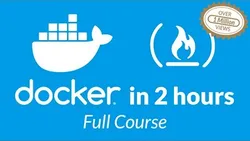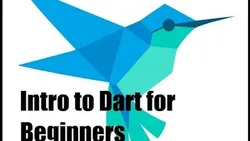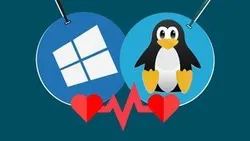
Docker Tutorial for Beginners - A Full DevOps Course on How to Run Applications in Containers 
This comprehensive course provides an introduction to Docker, teaching users how to run applications in containers. With hands-on labs, beginners can quickly learn the fundamentals of Docker and start using it in their own projects. ▼
ADVERTISEMENT
Course Feature
![]() Cost:
Cost:
Free
![]() Provider:
Provider:
freeCodeCamp
![]() Certificate:
Certificate:
Paid Certification
![]() Language:
Language:
English
![]() Start Date:
Start Date:
On-Demand
Course Overview
❗The content presented here is sourced directly from freeCodeCamp platform. For comprehensive course details, including enrollment information, simply click on the 'Go to class' link on our website.
Updated in [March 06th, 2023]
This course provides an introduction to Docker, a tool designed to make it easier to create, deploy, and run applications by using containers. Students will learn how to use Docker to package and deploy applications in containers, and how to use Docker to manage and scale applications. Through hands-on labs, students will gain experience with the Docker commands and tools to build, ship, and run distributed applications. By the end of the course, students will have a solid understanding of how to use Docker to create, deploy, and manage applications.
[Applications]
After completing this course, learners can apply their knowledge of Docker to develop and deploy applications in containers. They can also use Docker to create and manage containerized applications, automate deployment and scaling of applications, and build and share container images. Additionally, learners can use Docker to orchestrate and manage multi-container applications, and use Docker Compose to define and run multi-container applications.
[Career Paths]
1. DevOps Engineer: DevOps Engineers are responsible for managing the development, deployment, and operations of applications and services. They are responsible for automating processes, ensuring the reliability and scalability of applications, and monitoring the performance of applications. As the demand for DevOps Engineers continues to grow, the need for professionals with experience in Docker is becoming increasingly important.
2. Cloud Engineer: Cloud Engineers are responsible for designing, deploying, and managing cloud-based applications and services. They are responsible for ensuring the security and reliability of cloud-based applications and services, as well as optimizing performance and scalability. As the demand for cloud-based applications and services continues to grow, the need for professionals with experience in Docker is becoming increasingly important.
3. Software Developer: Software Developers are responsible for designing, developing, and testing software applications. They are responsible for ensuring the reliability and scalability of applications, as well as optimizing performance. As the demand for software applications continues to grow, the need for professionals with experience in Docker is becoming increasingly important.
4. System Administrator: System Administrators are responsible for managing the hardware and software of a system. They are responsible for ensuring the security and reliability of systems, as well as optimizing performance and scalability. As the demand for systems continues to grow, the need for professionals with experience in Docker is becoming increasingly important.
[Education Paths]
1. Bachelor of Science in Computer Science: This degree path provides students with a comprehensive understanding of computer science fundamentals, including programming, software engineering, and computer architecture. Students will also learn about the latest technologies and trends in the field, such as artificial intelligence, machine learning, and cloud computing. This degree path is ideal for those looking to pursue a career in software development, data science, or DevOps.
2. Bachelor of Science in Information Technology: This degree path focuses on the application of technology to solve business problems. Students will learn about the latest technologies and trends in the field, such as cloud computing, cybersecurity, and data analytics. This degree path is ideal for those looking to pursue a career in IT management, software engineering, or DevOps.
3. Master of Science in Computer Science: This degree path provides students with an advanced understanding of computer science fundamentals, including programming, software engineering, and computer architecture. Students will also learn about the latest technologies and trends in the field, such as artificial intelligence, machine learning, and cloud computing. This degree path is ideal for those looking to pursue a career in software development, data science, or DevOps.
4. Master of Science in Information Technology: This degree path focuses on the application of technology to solve business problems. Students will learn about the latest technologies and trends in the field, such as cloud computing, cybersecurity, and data analytics. This degree path is ideal for those looking to pursue a career in IT management, software engineering, or DevOps.
Course Provider

Provider freeCodeCamp's Stats at AZClass
The Docker for Beginners Tutorial is a complete DevOps course on how to run applications in containers. This comprehensive course introduces Docker, teaching users how to run applications in containers. With hands-on labs, beginners can quickly learn the fundamentals of Docker and start using it in their own projects. Get started with Docker with this end-to-end beginners course and hands-on labs. Short courses usually focus on a specific skill or topic and can be completed quickly and they may be ideal for users who want to learn something new but have limited time.
Discussion and Reviews
0.0 (Based on 0 reviews)
Explore Similar Online Courses

Dart for Beginners

How to Create a Custom WordPress Theme - Full Course

Python for Informatics: Exploring Information

Social Network Analysis

Introduction to Systematic Review and Meta-Analysis

The Analytics Edge

DCO042 - Python For Informatics

Causal Diagrams: Draw Your Assumptions Before Your Conclusions

Whole genome sequencing of bacterial genomes - tools and applications

Managing Docker on Linux Servers

Fundamentals of Docker and Kubernetes for NET Developers


Start your review of Docker Tutorial for Beginners - A Full DevOps Course on How to Run Applications in Containers